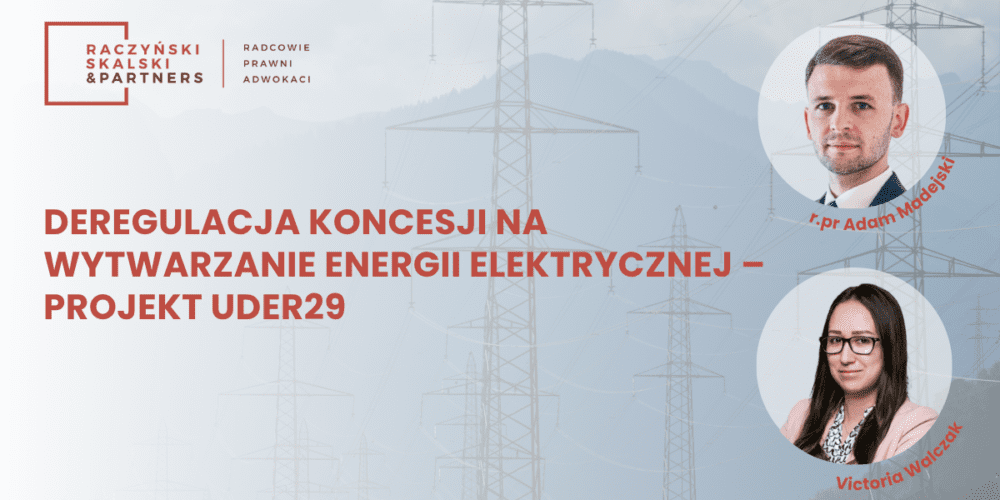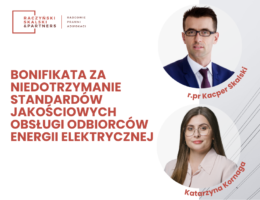The Government Legislation Center has published a draft law providing for the deregulation of certain aspects of energy law (UDER29), which was submitted to the Sejm on May 28, 2025.
One of the most important changes is a significant increase in the threshold for installed renewable energy capacity, above which a license for electricity generation (WEE) will be required. In this post, we discuss not only the content, but also the practical implications of the amendment for producers.
1. Increase in the installed capacity threshold for WEE licenses
The applicable regulations require that any entity intending to operate a renewable energy installation with an installed capacity of 1 MW or more obtain a WEE license. In practice, this regulation applies in particular to photovoltaic installations, which, due to their widespread availability, are eagerly chosen by investors as a source of electricity mainly for their own needs or for investment purposes. However, the licensing procedure is quite formalized and time-consuming, and the number of licensing obligations places an additional administrative and operational burden on producers. For this reason, many entrepreneurs are abandoning the construction of higher-capacity sources that would help reduce electricity demand costs. UDER29 provides for an increase in the installed capacity threshold above which a WEE license will be required, from 1 MW to 5 MW. This is a significant change that will significantly reduce regulatory obligations for many producers and pave the way for increased investment in large RES installations, which will primarily meet the owner’s own needs but will also be able to feed unused surpluses into the grid. Under the current legal framework, many entrepreneurs have decided not to build larger generation sources (above 1 MW) due to the need to obtain a WEE license and fulfill a number of obligations associated with its possession. In addition, raising the threshold will effectively relieve the Energy Regulatory Office in terms of the number of concession proceedings conducted, which in turn should translate into faster granting of WEE concessions to those producers who will still be subject to this obligation after the amendment. The provisions amending the WEE license are to enter into force on January 1, 2026.
2. Not a license, but an entry in the register of energy producers in renewable energy installations
Pursuant to the Renewable Energy Sources Act, electricity generation in small installations (with an installed capacity of 50 kW to 1 MW) is a regulated activity requiring not a WEE license, but an entry in a special register, commonly known as MIOZE (register of energy producers in small renewable energy installations). Starting from January 1, 2026, the obligation to enter the register will no longer be limited to small installations, as the amendment extends the group of producers required to enter the register to include producers operating renewable energy installations with an installed electrical capacity of 1 MW to 5 MW.
It is worth noting that the name of the register itself will also be modified, as it will no longer be the MIOZE register, but the register of energy producers in renewable energy installations.
3. Procedure for entry into the new register – practical aspects
According to the amendment, producers entered in the MIOZE register will be automatically considered to be entered in the newly created register of energy producers in renewable energy installations. This means that they do not have to take any additional action.
On the other hand, producers holding a WEE license for installations from 1 MW to 5 MW will be automatically entered into the new register, and their license will expire upon entry. Each producer subject to transfer to the new register will receive a certificate from the President of the Energy Regulatory Office confirming this action within 120 days of the amendments coming into force. Any proceedings for the granting of a WEE license or a promise of such a license that are ongoing and not completed before January 1, 2026, will be discontinued.
The changes involve very important practical issues that producers should take into account:
- The President of the Energy Regulatory Office will have the right to request a producer subject to transfer to the new register to supplement the data covered by the entry in the register within a specified time limit. Failure to comply with this obligation will result in removal from the register, thus preventing the conduct of activities involving the generation of electricity and its sale to consumers.
- In view of the above, it is advisable for the producer to provide the Energy Regulatory Office with the necessary information and documents required for entry in the register in accordance with the RES Act in advance, or at least to compile them. This applies in particular to confirmation of the date of the first generation of electricity and possession of documentation certifying the amount of electricity generated and sold.
- Entrepreneurs who currently operate RES installations with an installed capacity of 1 to 5 MW in full self-consumption mode and who record periodic electricity surpluses that are subject to loss should consider changing the connection conditions and obtaining the possibility of feeding these surpluses into the grid for sale, thus obtaining an additional source of income.
- Investors planning to launch RES installations with a capacity of 1 to 5 MW in 2025 should analyze whether delaying the launch of such an installation until the beginning of 2026 would be more profitable in order to avoid the WEE concession procedure. Assuming that, in an optimistic scenario, obtaining a license takes several months, there may be no significant difference in the date of commencement of electricity sales between the date of obtaining a WEE license and the date of entry in the new register. In this case, the costs incurred in connection with the license granting procedure will be saved.



